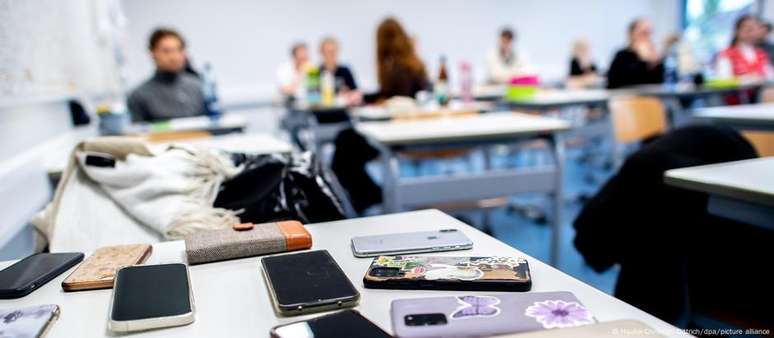The Senate has approved a bill that limits the use of devices in the classroom. If approved by the president, the law will apply to public and private institutions, from kindergarten to high school. The Senate approved this Wednesday (18/12), with a symbolic vote, a bill banning the use of cell phones in schools. early childhood, elementary and secondary school students. The text, which is approved by the Ministry of Education, now goes to presidential approval and, if approved by the Presidency, will affect public and private educational institutions.
With the new rule, students will not be able to use any type of portable electronic device during lessons, breaks or breaks, including for example tablets with Internet access.
Students will be able to bring their smartphone to school, but they will only be able to access it in exceptional situations, such as in cases of “danger, necessity or force majeure”, we read in the text.
In the classroom, cell phones can be used for pedagogical or didactic purposes and under the guidance of teachers. The exception also applies if the electronic device contributes to accessibility and inclusion, meets health conditions and guarantees fundamental rights.
In practice, the text allows children and adolescents to maintain contact with their guardians, for example, in the event of a health emergency or if they need help in a risk situation. Students with disabilities who use assistive technologies will also have access to electronic devices.
Prevention training
To adapt to the new rule, schools must develop strategies to discuss with students the mental health risk associated with unrestricted cell phone use.
Professionals must also receive training to identify and prevent students’ mental distress due to excessive screen use. The text cites measures to mitigate nomophobia among students, or the fear of not being able to use a smartphone.
The project also includes the creation of reception spaces for students and staff to address the issue.
The measure does not create a model of punishment for schools that do not comply with the law. According to the project’s rapporteur in the Senate, Alessandro Vieira (MDB-SE), the text limits itself to “orienting a public educational policy”.
“The rule is that the student leaves the cell phone turned off, with the sound turned off, in the backpack or in the structure that has space, and concentrates completely on the lesson. It is a very simple project, it wants to attract the student’s attention, bring that student to pay attention in class,” the senator argued during the debate.
Government support
If the sanction takes place this year, the new practice could go into effect in the 2025 school year.
The expectation is that the government will approve the text in its entirety. In October, Education Minister Camilo Santana said that the bill already includes the opinion of the MEC, who agrees with the veto on the devices.
The first draft of the proposal, which has been pending in Congress since 2015, proposed banning smartphones only in class and not during breaks, but the bill advanced to the House with more restrictions, under the leadership of the MEC.
The rule has sparked debate
Despite reaching unanimity among the senators, two amendments were presented. One of them, drafted by Senator Rogério Marinho (PL-RN), aimed to establish compulsory education only in nursery school and elementary education, from the 1st to the 9th year, excluding secondary education. The MP’s argument was to apply the policy gradually. The amendment ended up being rejected.
Another amendment, signed by Senator Eduardo Girão (Novo-CE), was presented to impose the installation of cameras in classrooms, but, after debates, the parliamentarian withdrew the proposal.
According to Girão, the cameras are necessary because without cell phones students would not be able to protect themselves from alleged “cases of indoctrination” by teachers. “What is the problem of indoctrination? I know that it is a minority of teachers, a minority of minority, but there are several cases of indoctrination, of misrepresentations. How will we have this kind of control? So, the solution that what what we did was install security cameras,” he said.
The model exists in other countries
Countries such as China, France, Spain, Greece, Denmark, Italy and the Netherlands already have legislation restricting cell phone use in schools. In Brazil, Rio de Janeiro was a pioneer in adopting the measure, which has been in force in the capital of Rio since February this year. A similar project has been approved in Sao Paulo and will be implemented next year.
In his argument, speaker Alessandro Vieira cited data from the Organization for Economic Co-operation and Development (OECD), which shows that students who spent more time in front of screens performed worse on the International Student Assessment Program ( Pisa). The study also indicated that 65% of students worldwide say their device distracts them in lessons such as math. In Brazil the rate reaches 80%.
gq/cn (Agência Brasil, Agência Senado, ots)
Source: Terra
Rose James is a Gossipify movie and series reviewer known for her in-depth analysis and unique perspective on the latest releases. With a background in film studies, she provides engaging and informative reviews, and keeps readers up to date with industry trends and emerging talents.


![Everything for pre -light: What awaits you on Friday, July 4, 2025, in the 15th episode [SPOILERS] Everything for pre -light: What awaits you on Friday, July 4, 2025, in the 15th episode [SPOILERS]](https://fr.web.img6.acsta.net/img/04/71/0471455b51e87d83e3d6d7537cd20fbe.jpg)




